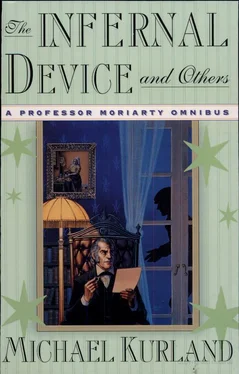I put down my coffee cup. "Puncture marks — my dear Moriarty!"
Moriarty sipped his coffee. "No, Barnett," he said. "They are not the marks of a vampire, and neither are they the punctures of a viper. They are too wide apart, coming low on the neck and almost under the ear on each side of his head. There are some older puncture marks also, in odd places; on the inner thighs and under the arms. They do not seem to have contributed to his death, but what purpose they served is unknown."
Moriarty drank a second cup of coffee, staring at the fireplace, apparently deep in thought. Then Mummer Tolliver, Moriarty's midget-of-all-work, came in with bundles of newspapers, and Moriarty began slowly going through them. "It is as I remembered," he said finally. "Look here, Barnett: the naked body of a young man was found floating in the Thames last week, with two unexplained puncture marks."
"In his neck?" I asked.
"In his upper arms. And here — three weeks previously the body of a girl, clad only in her shift, was discovered in a field in Lower Norwood. She had what the Gazette describes as strange bruises on her legs."
"Is that significant?" I asked.
"Scotland Yard doesn't think so," Moriarty said. After a moment's reflection he put down the paper and jumped to his feet. "Come, Barnett!" he cried.
"Where?" I asked, struggling into my jacket.
"Since we cannot get satisfactory answers as to the manner of Lord Vincent Tams's death, we must inquire into the manner of his life. We are going to Abelard Court."
"I thought the Paradol Club was in Montague Street."
"It is," Moriarty said, clapping his hat on his head and taking up his stick. "But we go to Abelard Court. Come along!"
We waved down a passing hansom cab, Moriarty shouted an address to the driver, and we were off. "I must tell you, Barnett," Moriarty said, turning to face me in the cab. "We are going to visit a lady who is a good friend and is very important to me. Society would forbid us calling her a 'lady,' but society is a fool."
"Important to you how?" I asked.
Moriarty stared at me for a moment. "We have shared events in our lives that have drawn us very close," he said. "I trust her as fully as I trust myself."
The address the hansom cab let us off in front of was a paradigm of middle-class virtue, as was the lady's maid who answered the door, though her costume was a bit too French for the more conservative household.
"Is Mrs. Atterleigh at home?" Moriarty asked. "Would you tell her that Professor Moriarty and a friend are calling?"
The maid curtseyed and showed us to a drawing room that was decorated in pink and light blue, and filled with delicate, finely detailed furniture that bespoke femininity. Any male would feel rough and clumsy and out of place in this room.
After a brief wait, Mrs. Atterleigh entered the drawing room. One of those ageless mortals who, in form and gesture, encompass the mystery that is woman, she might have been nineteen, or forty, I cannot say. And no man would care. Her long brown hair framed a perfect oval face and intelligent brown eyes. She wore a red silk house dress that I cannot describe, not being adept at such things, but I could not but note that it showed more of her than I had ever seen of a woman to whom I was not married. I did not find it offensive.
"Professor!" she said, holding out her arms.
Moriarty stepped forward. "Beatrice!"
She kissed him firmly on the cheek and released him. "It has been too long," she said.
"I have a favor to ask," Moriarty said.
"I, who owe you everything, can refuse you nothing," she replied.
Moriarty turned. "This is my friend and colleague, Mr. Barnett," he said.
Beatrice took my hand and firmly shook it. "Any friend of Professor Moriarty has a call on my affections," she said. "And a man whom Professor Moriarty calls 'colleague' must be worthy indeed."
"Ahem," I said.
She released my hand and turned to again clasp both of Moriarty's hands in hers. "Professor Moriarty rescued me from a man who, under the guise of benevolence, was the incarnation of evil."
I resisted the impulse to pull out my notebook then and there. "Who?" I asked.
"The monster who was my husband, Mr. Gerald Atterleigh," she replied.
"Moriarty, you never—" I began.
"It was before you joined my organization," Moriarty said. "And I didn't discuss it later because there were aspects of the events that are better forgotten."
"Thanks to Professor Moriarty, Gerald Atterleigh will no longer threaten anyone on this earth," Mrs. Atterleigh said. "And I pity the denizens of Hell that must deal with him."
Moriarty let go of Mrs. Atterleigh's hands, looking self-conscious for the first time since I had known him. "It was an interesting problem," he said.
Mrs. Atterleigh went to the sideboard and took a decanter from the tantalus. "It is not too early, I think, for a glass of port," she said, looking questioningly at us.
"Thank you, but we cannot stay," Moriarty said.
"A small glass," she said, pouring the umber liquid into three small stemmed glasses and handing us each one.
Moriarty took a sip, and then another, and then stared down at his glass. "My God!" he said. "This is the aught-nine Languert D'or! I didn't know there was any of this left in the world."
"I have a new gentleman friend," she said. "His cellars, I believe, are unrivaled. Now, what can I do for you, my dear professor?"
"Vincent Tams, the newly defunct Earl of Whitton," Moriarty said. "Do you know of him?"
"He died at the Paradol Club last month," Mrs. Atterleigh said. "I believe he was alone in bed at the time, which was unlike him."
"He was a regular visitor to the demimonde?"
"Say rather he dwelled in its precincts," Mrs. Atterleigh said.
Moriarty turned to me. "Mrs. Atterleigh is my gazette to the fils du joi —the harlots, strumpets, and courtesans of London," he said. "They all trust her, and bring her their problems. And on occasion, when it violates no confidences, she passes on information to me."
I remained silent and sipped my port.
"Was his lordship keeping a mistress?" Moriarty asked.
"Always," Mrs. Atterleigh replied. "He changed them every three or four months, but he was seldom without."
"Do you know who was the current inamorata at the time of his death?"
"Lenore," she said. "Dark haired, slender, exotic looking, artistic; she is, I believe, from Bath."
"Will she speak with me?" Moriarty asked.
"I'll give you a note," Mrs. Atterleigh said. "I would come with you, but I'm expecting company momentarily."
Moriarty rose to his feet. "Then we will not keep you. If you would be so kind—"
Mrs. Atterleigh went to her writing-desk and composed a brief note, which she handed to Moriarty. "I have written the address on the outside," she said. "Please come back to see me soon, when you don't have to run off."
"I shall," Moriarty said.
She turned to me and stretched out a hand. "Mr. Barnett," she said. "You are welcome here, too. Anytime. Please visit."
"I would be honored," I said.
We left the house and walked down the street to hail a cab. As the vehicle took us back up the street again, I saw a black covered carriage stop in front of the house we had just left. A man in formal attire got out and went up the steps. Just as we passed he turned around to say something to his driver and I got a good look at his face. "Moriarty!" I said. "That was the prime minister!"
"Ah, well," Moriarty said. "He is reputed to have an excellent wine cellar."
The address we went to was in a mews off St. Humbert's Square. A small woman with raven-black hair, bright dark eyes, and a cheerful expression threw the door open at our ring. She was wearing a painter's smock, and by the daubs of color on it I judged that the garment had seen its intended use. "Well?" she demanded.
Читать дальше












